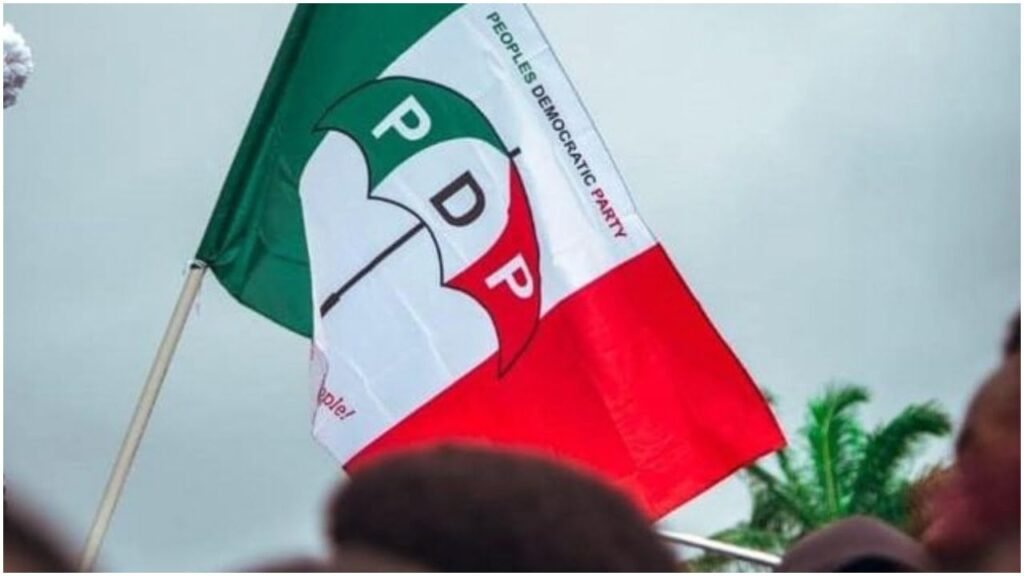AS the crisis within the Peoples Democratic Party persists, new factional acting National Chairman Yayari Mohammed has challenged the rival National Working Committee led by Umar Damagum to act on their security threats.
The acting National Publicity Secretary, Ibrahim Abdullahi of the Damagum-led NWC faction, at a press conference in Abuja on Monday warned of potential security measures against Mohammed’s faction in order to uphold the rule of law during the ongoing internal disputes.
The opposition party has been embroiled in an internal crisis since 2022, which has polarised its NWC.
The crisis rocking the PDP took a twist on Friday when its national leadership broke into two factions with Yayari Mohammed, and the acting national chairman, Umar Damagum, leading each of the two factions.
PDP’s factionalisation followed the suspension of its National Legal Adviser, Adeyemi Ajibade, and the National Publicity Secretary, Debo Ologunagba, by a faction of the NWC led by Damagum, on Friday, after the 593rd meeting of the NWC on Thursday.
Ibrahim Abdullahi and Okechukwu Osuoha were appointed by the faction to replace the duo in acting capacities.
But in a counter statement, the National Publicity Secretary, Ologunagba announced the suspension of Damagum and the National Secretary, Samuel Anyanwu, by the NWC due to what the statement described as the series of complaints raised against the duo.
On the same day, a Federal High Court sitting in Abuja restrained the NEC, the highest decision-making organ of the party, and the Board of Trustees from removing Damagum as the acting national chairman.
In a judgment delivered via Zoom, Justice Peter Lifu ordered that apart from Damagum, no other person must be recognised as the PDP acting national chairman until the party’s convention scheduled for December 2025.
Speaking on the basis of the court order at the press conference on Monday, Abdullahi, warned the Mohammed group against disobeying the judgment recognising Damagum as the authentic chairman of the party.
He stated, “We must ensure that certain actions are not guided by sentiments and personal interests, but by the party’s constitution.
“In the face of this reckless violation of a subsisting court order, we are left with no option but to deploy the services of security agencies to enforce the rule of law.”
Abdullahi added that to enhance the learning process of party leadership and administration, members must ensure that actions were based on the party’s constitution and existing guidelines, rather than influenced by “sentiments and personal interests.”
He added, “Let all concerned know that the Deputy National Publicity Secretary, my humble self, now acting National Publicity Secretary and Deputy National Legal Adviser and now Acting National Legal Adviser assumed office following the Decision of the NWC; and it is in line with the PDP Constitution (2017 as Amended) following the absence of our substantive officers. It is made abundantly clear in Section 40(2) and 42(2).
Meanwhile, four other governors, led by Oyo State Governor Seyi Makinde are opposed to Damagum’s removal.
Others with Makinde are Governors Ahmadu Fintiri of Adamawa State, Caleb Mutfwang of Plateau State, and Agbu Kefas of Taraba State.
However, two out of the 13 governors are neutral. They are Governor Peter Mbah of Enugu State and Dauda Lawal of Zamfara State.
Before the suspensions that rocked the PDP on Friday, the party had scheduled a NEC meeting for October 24 to elect a substantive national chairman to complete the tenure of Dr. Iyorchia Ayu, while Damagum was expected to revert to his position as National Vice Chairman (North).
This newspaper learnt that the state governors were considering the appointment of a caretaker committee to run the affairs of the party until December 2025, when the tenure of the present NWC would expire.
However, following Monday’s inconclusive online meeting, the PDP governors will be hoping to reach a comprise on the crisis today.
Meanwhile, a chieftain of the party, Dr. Adetokunbo Pearse, has said that the current situation in the party’s national structure is not a crisis but a power tussle, common to political parties globally.







